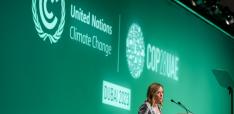From Summit Commitments to Action: The Urgency of Pre-Arranged Financing

Lydia Poole introduces a new report that shows why pre-arranged financing is a critical component in improving crisis response but that it requires support from international stakeholders to be affordable.
As COP28 comes to a close in Dubai, we mark a significant milestone for the once niche field of pre-arranged finance. The inaugural annual report, "The State of Pre-arranged Financing for Disasters 2023," provided new evidence ahead of COP28 about how the world’s financial systems are geared up for disaster risk finance. The data and conclusions from this report proved to be a key talking point during this pivotal global climate platform.
Over the course of the COP, it was clear from the high level debates, panel discussions and networking events that the landscape of climate risk and resilience and disaster preparedness and response is evolving rapidly, and a crucial milestone moment in understanding, measuring, improving and advancing the case for pre-arranged finance has arrived.
Momentously, the first day of COP28 saw a landmark agreement reached on the operationalisation of a 'Loss and Damage Fund' and funding arrangements, which will provide financial support to countries suffering from the irreversible and unavoidable impacts of climate change.
During COP28 the Global Shield against Climate Risks also gained momentum, as part of the mosaic of funding arrangements, in line with its mission to increase protection for people in climate-vulnerable countries through pre-arranged and trigger-based finance.
 It was also made clear that we need to acknowledge how debt sustainability is a serious concern for many low- and middle-income countries, and rising reinsurance costs under current market conditions have increased the overall costs of insurance – a key aspect of pre-arranged finance. Under these circumstances, pre-arranged financing is increasingly challenging for governments to prioritise, and will require premium support from international stakeholders to help make the terms more affordable.
It was also made clear that we need to acknowledge how debt sustainability is a serious concern for many low- and middle-income countries, and rising reinsurance costs under current market conditions have increased the overall costs of insurance – a key aspect of pre-arranged finance. Under these circumstances, pre-arranged financing is increasingly challenging for governments to prioritise, and will require premium support from international stakeholders to help make the terms more affordable.
Driving the expansion of pre-arranged finance
The number of people whose lives are threatened by crises is increasing and current responses are inadequate and inefficient. Pre-arranged financing is a critical component in improving crisis response, and the financial mechanisms that are used to develop pre-arranged financing are not limited to insurance.
The topic of pre-arranged finance has now been elevated to a key focus of climate policy and multilateral reform. This increased attention could be positive to drive expansion. But right now, we find that pre-arranged finance is failing the needs of the most climate- and crisis-vulnerable countries and people; and the affordability of financial protection is a significant constraint.
The key findings from the State of Pre-arranged Finance for Disasters report, released in November 2023, provided critical evidence to influence discussions at COP28. The evidence showed that while pre-arranged finance has made significant strides, it still faces challenges in reaching the poorest and most vulnerable populations.
Just 2.7% of the total share of the USD71 billion international crisis financing was used for pre-arranged finance in 2021 (total figure was USD1.9 billion). The report also shows that just 3.7% of international development financing for pre-arranged finance reached low-income countries between 2017 and 2021 (total figure was USD200.8 million).
So, while the small levels of pre-arranged financing that are available have seen some growth, challenges remain in terms of distribution, financing instruments, and affordability. The facts are clear: low-income and climate vulnerable countries are not getting enough support to respond and recover from shocks and disasters.
As the world grapples with the increasing impacts of climate change, such as more frequent and more severe extreme events, pre-arranged finance offers a path towards a more secure and resilient future. Coming off the back of COP28 , decision-makers are turning their attention to operationalising budget and policy commitments into a blueprint for meaningful action and investment. That leaves no one behind.
At the Centre, we sit at the nexus between climate, development finance, and humanitarian finance. We have witnessed meaningful progress across key global policy and multilateral reform agendas this year - from the momentum behind the Bridgetown and Accra-Marrakesh Agendas, the commitments of the World Bank’s Evolution Roadmap and commitments of the Paris Summit on a New Financing Pact, to the SDG Stocktake and Global Stocktake on the world’s progress on climate action.
It is critical that these threads are now brought together. This is a unique moment of possibility, and we must seize this opportunity to advocate for far greater use of pre-arranged finance that delivers for climate- and crisis-vulnerable people.
Lydia Poole, Associate Director - Policy and Evidence at the Centre for Disaster Protection (the Centre) and co-Author of The State of Pre-arranged Financing for Disasters 2023.


